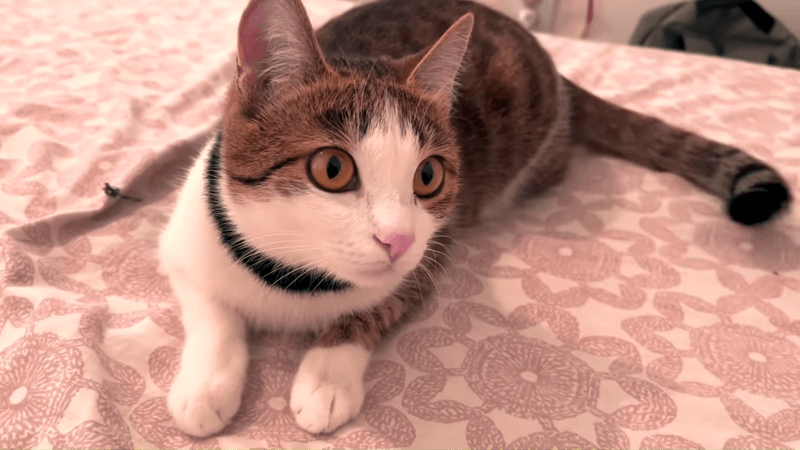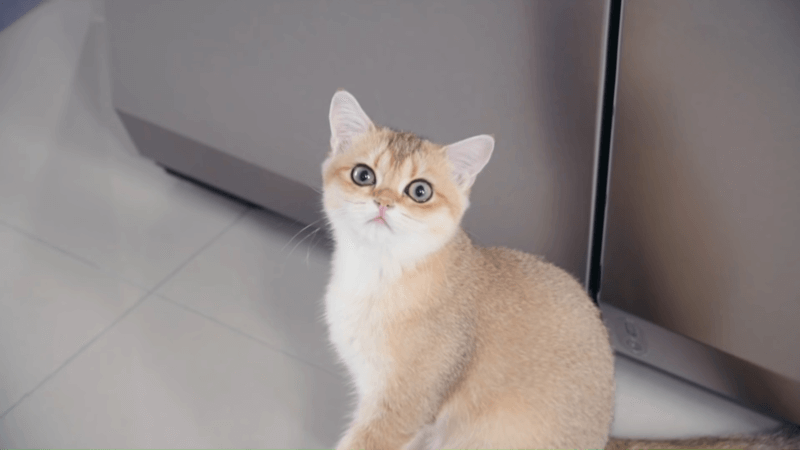No products in the cart.
CBD for cat stomach pain is garnering increasing attention as a potential remedy to provide relief for our beloved feline friends. As caring cat owners, we’re always on the lookout for effective and safe ways to alleviate any discomfort our pets may experience. In this blog, we will discover CBD for cat stomach pain, how do I know if my cat has stomach pain, and can cat allergies cause stomach pain.
CBD for Cat Stomach Pain
CBD is a natural compound derived from the hemp plant. It’s part of a group of compounds known as cannabinoids. CBD has gained attention for its potential therapeutic properties in humans and animals, including cats. When it comes to cat stomach pain, CBD oil is being explored as a potential remedy due to its interaction with the endocannabinoid system (ECS) found in all mammals, including cats. Visit Pet CBD Club for a wider selection of wonderful CBD pet products.

CBD’s Potential Benefits for Pets
CBD offers a range of potential benefits for pets, including cats, due to its interactions with the endocannabinoid system. Some of these potential benefits include:
- Pain Management: CBD’s anti-inflammatory properties may help alleviate pain caused by various conditions, including stomach discomfort.
- Anxiety and Stress Relief: CBD might have calming effects on the nervous system, potentially helping cats manage stress, anxiety, and related stomach issues.
- Anti-Nausea Effects: CBD could help reduce nausea and vomiting, which are common symptoms of cat stomach pain.
- Appetite Stimulation: Cats experiencing stomach pain might have reduced appetite; CBD could potentially help stimulate appetite.
- Improved Mood: CBD’s interaction with neurotransmitters might contribute to improved mood and overall well-being in cats.
CBD’s Effectiveness in Managing Pain and Inflammation
Research on CBD’s effectiveness in managing pain and inflammation is ongoing, and while there is promising evidence, more studies are needed to fully understand its mechanisms of action and potential benefits.
Studies in animals and humans have indicated that CBD oil cats interacts with receptors involved in pain perception and inflammation regulation. This interaction might lead to a reduction in pain and inflammation symptoms. While some pet owners report positive results in managing their pets’ pain and discomfort with CBD, it’s important to approach these findings cautiously..
Considerations When Choosing CBD Products
When selecting CBD products to help manage your cat’s stomach pain, it’s essential to prioritize their safety and well-being. Here are some considerations to keep in mind:
- Consult a Veterinarian: Before introducing any CBD products, consult your veterinarian to ensure that CBD is appropriate for your cat’s specific condition and to determine the right dosage.
- Quality and Source: Choose CBD products derived from high-quality, organic hemp. Look for products that are third-party tested for purity, potency, and the absence of contaminants.
- Full-Spectrum vs. Isolate: Decide whether to use full-spectrum CBD (containing multiple cannabinoids and terpenes) or CBD isolate (pure CBD). Full-spectrum CBD may offer additional benefits due to the entourage effect.
- THC Content: Opt for products with minimal or no THC content to avoid any potential intoxicating effects on your cat.
- Formulation: Select a CBD product that is specifically formulated for cats. Consider options like CBD oil or treats that are easy for your cat to consume.
- Dosage: Follow the dosing guidelines provided by the manufacturer or your veterinarian. Start with a low dose and gradually increase it while monitoring your cat’s response.
- Ingredients: Check the ingredients list to ensure there are no additives or flavorings that could upset your cat’s stomach further.
How Do I Know If My Cat Has Stomach Pain
Identifying stomach pain in cats can be challenging since they’re experts at hiding discomfort. However, there are several signs to look out for:
- Changes in Appetite: A sudden decrease in food intake or refusal to eat might indicate stomach pain.
- Vomiting and Regurgitation: Frequent vomiting, especially if it contains undigested food, can signal stomach discomfort.
- Abnormal Postures: Hunching over, stretching out, or adopting a protective posture could suggest abdominal pain.
- Lethargy: If your cat is unusually lethargic, lacks energy, or avoids activity, it could be due to discomfort.
- Behavioral Changes: Unexplained aggression, hiding, or increased irritability might indicate your cat is in pain.
- Restlessness: Frequent pacing, inability to settle, or repeatedly changing positions could be signs of discomfort.
- Vocalization: Excessive meowing, groaning, or hissing may indicate your cat’s distress.
- Grooming Changes: Overgrooming, neglecting grooming, or licking the abdomen excessively can signal discomfort.
- Litter Box Issues: Straining in the litter box, avoiding it, or producing loose stools could be connected to stomach pain.

Common Signs and Symptoms
Cats are known for hiding signs of discomfort, but attentive observation can help you identify potential stomach pain. Some common signs and symptoms to watch for include:
- Changes in Appetite: A sudden decrease or loss of appetite could indicate stomach pain or discomfort.
- Vomiting or Regurgitation: Frequent vomiting or regurgitation, especially if accompanied by other symptoms, may indicate stomach issues.
- Abdominal Discomfort: Your cat might display signs of discomfort, such as restlessness, hunching, or reluctance to lie down.
- Lethargy: If your cat is unusually lethargic and lacks energy, it could be a sign of an underlying issue, including stomach pain.
- Changes in Grooming Behavior: Cats may groom less or neglect grooming altogether if they’re experiencing stomach discomfort.
- Vocalization: Excessive meowing, groaning, or hissing can signal pain or distress.
- Litter Box Changes: Straining in the litter box, changes in stool consistency, or avoiding the litter box could be indicative of stomach pain.
- Restlessness: Your cat might frequently change positions, pace around, or be unable to find a comfortable position.
The Impact of Stomach Pain on Cats
Stomach pain can significantly impact a cat’s overall well-being:
- Quality of Life: Stomach pain can lead to decreased quality of life due to discomfort and reduced activity levels.
- Behavioral Changes: Cats in pain might exhibit behavioral changes like aggression, hiding, or withdrawal.
- Appetite and Nutrition: Pain can reduce appetite, leading to weight loss and nutritional deficiencies.
- Grooming: Cats may neglect grooming, leading to a dull coat and potential skin issues.
- Mood and Interaction: Pain can alter cats’ moods, affecting their interaction with humans and other pets.
- Stress and Anxiety: Chronic pain can contribute to stress and anxiety, exacerbating the situation.
- Medical Complications: Unaddressed stomach pain could lead to complications, affecting other organ systems.
Diagnosing Cat Stomach Pain
Diagnosing stomach pain in cats involves a combination of observations and veterinary assessments:
- Physical Examination: A veterinarian will examine your cat’s body, paying attention to their abdomen’s sensitivity, shape, and any abnormalities.
- Medical History: Providing your cat’s medical history, diet, recent changes, and behavioral observations helps in diagnosis.
- Blood Tests: Blood work can indicate abnormalities, inflammation, or underlying medical conditions.
- Imaging: X-rays or ultrasounds can reveal issues like blockages, tumors, or foreign objects in the stomach.
- Fecal Analysis: Analyzing your cat’s stool can provide insights into digestive health and potential infections.
- Endoscopy: In some cases, a small camera can be inserted into the digestive tract for direct visualization.
- Trial Treatments: If the cause of stomach pain is unclear, your vet might recommend trying treatments to observe if there’s an improvement.
Can Cat Allergies Cause Stomach Pain?
Yes, in certain circumstances cat allergies may result in stomach ache. An immunological reaction brought on by allergies can result in inflammation and discomfort, including gastrointestinal problems. While stomach aches may not be the main sign of cat allergies, it is possible for allergic reactions to impact the digestive system among other bodily systems.

Connection Between Cat Allergies and Stomach Problem
The immunological response of the body is what links cat allergies to stomach aches. An allergic reaction in a cat can be caused by exposure to allergens such as cat dander, pollen, or specific proteins. Numerous symptoms, such as nausea, vomiting, diarrhea, and even changes in appetite, can be brought on by these medications.
It’s crucial to remember that although allergic reactions may aggravate stomach pain, they may not be the only factor. A veterinarian should appropriately analyze and assess additional issues, such as food, illnesses, or underlying medical disorders.
Common Allergens That Can Trigger Stomach Discomfort
Several common allergens can potentially trigger stomach discomfort in cats, including:
- Cat Dander: Cats produce dander, tiny skin particles that can trigger allergic reactions in sensitive individuals and potentially lead to digestive symptoms.
- Pollen: Outdoor allergens like pollen can be brought indoors on a cat’s fur, causing allergic reactions that might manifest as stomach pain.
- Food Allergens: Cats can be allergic to certain ingredients in their diet, leading to gastrointestinal symptoms like stomach pain, vomiting, or diarrhea.
- Household Allergens: Allergens from household cleaners, fabrics, or other materials might contribute to allergies and subsequent stomach discomfort.
- Inhalants: Inhalant allergens, such as mold spores or dust mites, could potentially trigger allergic reactions that affect the digestive system.
- Flea Allergies: Flea bites can cause allergic reactions in some cats, leading to itching, discomfort, and potential digestive symptoms.
Conclusion
Exploring the potential of CBD for cat stomach pain unveils a realm of hope and relief. As CBD interacts with the endocannabinoid system, it offers a range of potential benefits, from managing pain and inflammation to alleviating stress and nausea. However, this journey should be navigated with the expert guidance of a veterinarian, ensuring a safe and effective path toward feline well-being. Furthermore, understanding the signs of stomach pain in cats, making informed CBD product choices, and recognizing the impact of allergies on digestion all contribute to a comprehensive approach to nurturing the health and happiness of our cherished feline companions.
I am Nelson Cooper, I pursue my passion for writing and my belief is that cats love humans. I enjoy traveling and have a deep appreciation for the beauty of nature, as well as a soft spot for animals, particularly cats.



